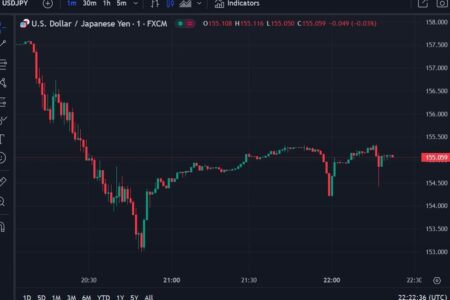The Bank of Japan first intervened on a Japanese holiday, which was Monday of this week. Then a second time just hours ago, during the New Zealand morning.
While they had influence both times, and they would be happy to do so, these two times are indicators of how weak they and the Ministry of Finance are:
1. They do not want to spend a lot of their US dollar reserves:
- Japan's foreign exchange reserves are limited
- The 2022 interventions cost the country about US$62 billion
2. For all the talk, they don't seem to have support from the US (except verbal support). It's just been an intervention in times of poor liquidity so far, and they don't want to take over the market. It's as if they are alone.
Earlier today:
USD/JPY update, volatility continues:
–
If you are interested in learning about the mechanisms of intervention and why you should monitor the Ministry of Finance instead of the Bank of Japan:
- The Ministry of Finance (MOF) of Japan is responsible for formulating the country's foreign exchange policy, while the Bank of Japan (BOJ) is responsible for implementing these policies, particularly with regard to intervention in the foreign exchange market.
- The Ministry of Finance can decide to intervene in the foreign exchange market if it believes (in the current situation) that the yen is too weak. Once the Ministry of Finance decides to intervene, it gives instructions to the Bank of Japan. The Bank of Japan then conducts operations in the foreign exchange market by purchasing the yen (in current conditions). The Foreign Exchange Fund Special Account (FEFSA), which falls under the jurisdiction of the Ministry of Finance, is used for interventions. You will notice that in the current situation, when the Bank of Japan buys the yen, it will turn to its US dollar reserves to finance the other side of the trade, buying US dollars (or other currencies if necessary).
- The Bank of Japan's operations are usually conducted through commercial banks that deal in the foreign exchange market. They may be spot transactions, or forward transactions scheduled to occur at a future date. Note that although the Ministry of Finance has the final authority to decide when to intervene, it does so in close consultation with the Bank of Japan. The Bank of Japan provides expertise and advice on monetary and financial market conditions, which can influence the Ministry of Finance's decision. This cooperation reflects the balance between the roles of the two entities: the Ministry of Finance as the government's main financial and economic advisor, and the Bank of Japan as the country's central bank that maintains stability in the financial system.
